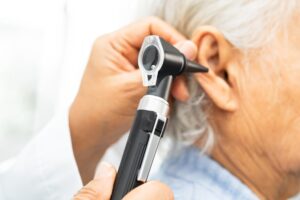Understanding the Genetic Links to Vertigo
As much as 40% of the adult population in the US will experience vertigo at some point in their lifetime, but why?
While the underlying causes of vertigo can vary, most now believe there is a strong genetic link between a person’s genetics and the conditions that can cause it.
This common condition is generally characterized as a spinning or dizzying sensation and can, for obvious reasons, affect and impair a person’s ability to fully enjoy life. Let’s take a closer look at what vertigo is exactly, its underlying causes, and the latest insights into the role genetics can play in it.
Understanding the Complexities of Vertigo
Before discussing the genetic links to vertigo, it’s important to understand the nature of this specific type of dizziness. Most who experience vertigo typically have the perception of movement, which is often described as swaying, spinning, and tilting. It often disorients the person experiencing it and can be accompanied by nausea and balance issues.
Vertigo can be broadly categorized into two primary types:
- Peripheral Vertigo is the most common form, which typically occurs because of disturbances to the inner ear. This can be caused by any number of factors including Meniere’s disease, benign paroxysmal position vertigo (BPPV), or vestibular neuritis.
- Central Vertigo is far less common and stems from issues within the brain, specifically the cerebellum or brainstem, and can be linked to other conditions like migraines, multiple sclerosis, or even brain tumors.
Unraveling the Genetic Puzzle
As interest grows in this unfortunately popular malady, scientists and researchers have begun to study and identify links between genetics and other conditions that can trigger vertigo.
Meniere’s Disease
Named after the French physician who discovered it, Meniere’s disease is a disorder typically characterized by severe or crippling vertigo, hearing loss, and tinnitus (a constant ringing of the ears). Subsequent research indicates that the likelihood of developing this disease is higher in those with first-degree relatives who suffer from this condition, showing a strong link between vertigo and genetics.
Migraine-Associated Vertigo
Research also has shown vertigo to be a common symptom of vestibular migraines, which has strong evidence for heritability. Because many who endure migraines also experience vertigo, the evidence suggests that genetic factors play a significant role in a person’s susceptibility to this condition.
BPPV and Its Potential Genetic Links
For one of the most common causes of vertigo, BPPV, the evidence for genetic causation is less clear-cut. While there is a small subset of family members who might experience similar bouts of BPPV, most documented cases are believed to occur without a known underlying cause.
Unraveling Complex Genetic Influences
As interest in understanding vertigo has grown, so too have observations of certain patterns within families. Where related individuals may share similar types or symptoms of vertigo, pinpointing which specific genes or genetic interactions might be involved has proven to be complex.
Through ongoing genetic studies, scientists work to uncover which specific genes and their interplay might cause a person to experience vertigo. Today, research continues to analyze the genomes of those who are affected and working to determine what common genetic markers or patterns might be passed down from one person to another in the hopes of treating or managing vertigo.
Your Partners in Vertigo Management
For those suffering from vertigo, audiologists play a crucial role in the diagnosis and treatment of this condition. At Colorado Ear Care, we specialize in diagnosing and managing vertigo for those affected.
Diagnosis begins with hearing and balance evaluations where our team of specialists conducts specific tests to assess an individual’s hearing and inner ear health. These tests can help pinpoint any issues within the ear and help to establish a detailed medical history complete with symptoms and potential triggers that might be causing these vertigo episodes.
With a diagnosis in hand, we work to establish treatments that address a person’s specific needs. For some, vertigo might be caused by tiny calcium particles that get lodged within the inner ear canals called ear crystals. Canalith Repositioning Maneuvers (CRM) can be a particularly effective treatment for this, whereas Vestibular Rehabilitation Treatment (VRT) might be a better option for other underlying causes where retraining your balance system is more appropriate.
Only through diagnosis and evaluation can we determine which treatment best suits a person’s needs.
Managing Hereditary Vertigo
Managing vertigo often requires a multifaceted approach, combining lifestyle adjustments, specialized therapies, and in some cases, medication or surgical intervention. Working with specialists can dramatically improve a person’s ability to live with this sometimes debilitating condition.
If your vertigo is suspected of having a hereditary element, we can work to create custom treatment plans that might include diet and lifestyle changes, physical therapy, or medication for managing symptoms or addressing underlying causes.
We also work to educate individuals on what genetic conditions might be contributing to a person’s vertigo, providing education and guidance to better manage their condition.
Seeking Specialized Care
While vertigo itself may not be inherited, it’s clear that there are many hereditary conditions that can cause a person to experience vertigo. With diagnosis and analysis, it’s possible to develop strategies and treatments that can help mitigate vertigo’s impact on a person’s daily life.
If vertigo is something that is impacting your quality of life, consider consulting with specialists who have experience and understanding of the complexities vertigo poses in maintaining a high quality of life, like the team at Colorado Ear Care.
Early intervention can significantly improve outcomes and offer relief for associated hereditary conditions. If you’re looking for expert advice and treatment options, book an appointment with Colorado Ear Care today.




